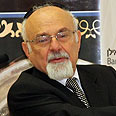
Turkey's rabbi: Erdogan a popular man
Rabbi Haleva tells Ynet of post-Marmara era, says Turkish Jews aren't suffering from anti-Semitism. 'We went through tough days, but no security problems'
It is a community which is trying with all its might to convey the feeling that nothing has changed, but the great efforts invested in saying that "everything's fine" reveal its insecurity.
Turkey's Chief Rabbi Yitzchak Haleva visited Israel last week as part of a conference initiated by Prof. Shmuel Refael, director of the Naime and Yehoshua Salti Center for Ladino Studies at Bar-Ilan University.
Haleva was happy to answer any question regarding Turkey's Jews or Ladino, but did not offer much on Turkish Prime Minister Recep Tayyip Erdogan or his stand regarding the diplomatic crisis with Israel.
"We don't intervene in political issues," he clarifies in a conversation with Ynet. "We have a good relationship with the government, and when we encounter problems we turn to them and they help us.
"We have a good relationship with the prime minister, who listens to our problems and tries to help. We act like a good community and don't take a political stand."

Marmara docks in Istanbul (Photo: AP)
Asked to address the problems encountered by the community, Rabbi Haleva avoids the security-related issues, like reinforcing security outside synagogues, and focuses on less essential difficulties.
"The Jewish cemetery has filled up," he says. "We turned to the local authority and were given a special area to set up a new Jewish cemetery."
'Unpleasant atmosphere'
As for the Jews who still live in Turkey, Rabbi Haleva tries to describe a life unaffected by the Marmara affair and the diplomatic crisis.
"Anti-Semitism? We have no special problem with anti-Semitism," he clarifies. "Anti-Semitism exists everywhere and for years, but we don't actually feel it. There are of course anti-Semitic journalists, but we are trying to advance a law against hatred.
"We hope that as part of the law, even those who don't engage in hateful activities, but just write about them, will be punished too. In the meantime we have failed, and the law only punishes those who have caused real damage."
What does the life of Turkey's Jews look like since the Gaza-bound flotilla?
"We went through tough days, absolutely, but there were no security problems, because whenever there's a need we turn to the police and they send guards over.
"There's no doubt that when a ship wants to cross the border it leads to an unpleasant atmosphere, because even though we have no political connection to Israel, we do have a connection and sympathy toward Jews."
Last week, TIME website readers chose Turkish Prime Minister Erdogan as Person of the Year for 2011, but a large number of readers also selected him as the most hated person.
Asked to address the choice, Rabbi Haleva remains loyal: "TIME's choice is their decision. He is undoubtedly a popular person, and like every public figure he has opponents."
No Reform Jews, no Conservatives
In the beginning of the 20th century, Turkey had some 300,000 Jews. Upon the State of Israel's establishment, many of them made aliyah and now the Turkish Jewish community includes some 20,000 people, most of them in Istanbul, which has 18 synagogues that are mostly active on Shabbat and Jewish holidays.
Istanbul also has a Jewish education system from kindergarten to high school, youth clubs and a Talmud Torah school.
The local rabbinate has a divorce court and a kashrut department, which is responsible for the kosher butcher shops. They produce kosher wine and cheese, and until three years ago they also had a matzah factory.
Although Turkey feels like Europe, its Jewish community is completely different. "It's a very special community, which isn't divided into various factions," explains Rabbi Haleva. "All Turkish Jews belong to Orthodox Judaism. There are no Reform Jews and no Conservatives.
"Turkey's Jews sympathize with the State of Israel like any other Jew. There is no anti-Zionism among us. Today there is no mass immigration to Israel because every Jew remains where he can make a living. Whoever fails in business makes aliyah."
What would you like to wish upon Turkey's Jews?
"I want world peace – that we'll open the television and not hear about explosions and gunshots. I think the entire world is thirsty for peace, and as a religious scholar I pray for peace everywhere. I believe that when a person prays, God listens."










